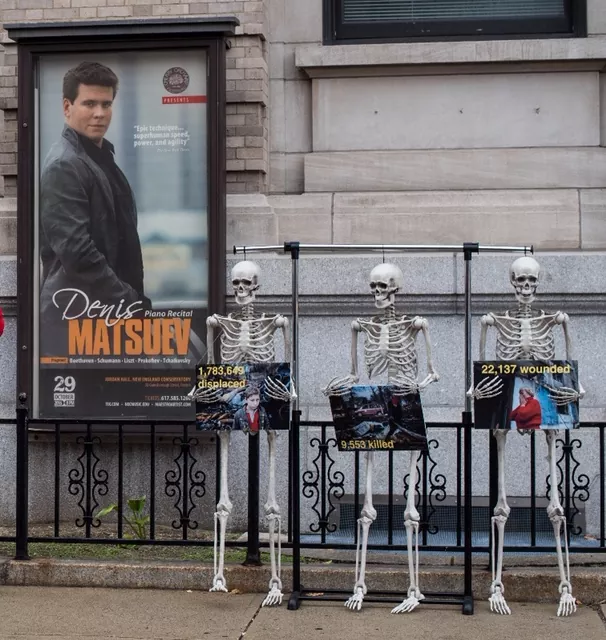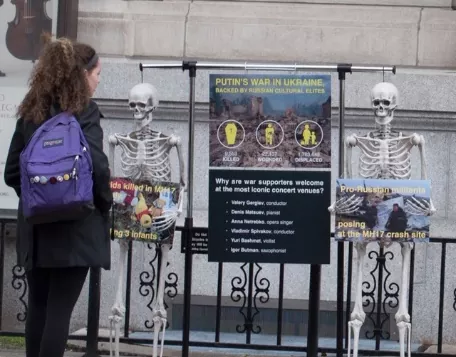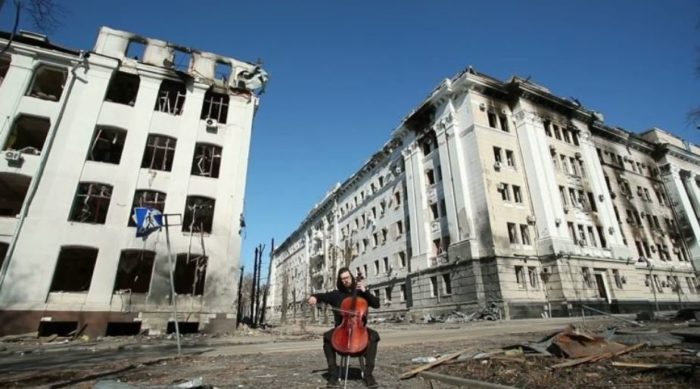In 2022, Russia invaded Ukraine. Sadly, this invasion is only the latest eruption in Russia’s igniting a continuous eight-year war against Ukraine – starting with the Kremlin’s illegal seizures of Crimea and Donbas in 2014. Deliberate targeting of innocent Ukrainian civilians and residences, and other brutal Russian war crimes are a daily tragedy.
Less well known is the accompanying “hybrid war.” Russia’s autocratic government has long manipulated their cultural superstars to bolster their regime at home – and in the West. Wealthy Russian oligarchs play a central and crucial role in these activities.
Performing in renowned Western concert halls and universities is considered a triumph by Russian citizens, and helps these performers build support for Putin at home. Yet, such consequences remain hidden to Western audiences because these artists refuse to answer any questions.
We encourage everyone to carefully consider the toxic influence these mega-billionaire oligarchs have long exerted in our societies. Ultimately, we urge all cultural and academic institutions to redirect the funds they received from these individuals – into projects helping Ukrainians, who are paying the price of the West not stopping Putin’s wars earlier.
At Arts Against Aggression (AAA), we have been educating American audiences about Russian performers who eagerly support Putin’s wars when in their homeland, but feign to be solely “artists, not politicians” when in the West.
In cooperation with the Anti-Corruption Action Center (combating corruption in Ukraine), we also started a petition calling upon institutions that accepted large sums of money to begin taking corrective actions.
Our group came together eight years ago, in response to 511 illustrious Russian artists and cultural figures signing an open letter in support of Putin annexing Crimea.
Remarkably, Harvard University decided to still allow two signatories of that letter, violinist Vladimir Spivakov and pianist Denis Matsuev, to perform in its historic Sanders Theater. Ushers followed Harvard’s directive to remove blue and yellow flowers (the colors of the Ukrainian national flag) from audience members.
Like Harvard, American cultural institutions that collaborate with pro-Putin performers risk damaging their own reputations. To illustrate, conductor Valery Gergiev was recently fired from his international contracts because he refused to condemn Russia’s invasion.
International sanctions slam Russia’s finance, economy, culture, sports: a list
Until then, Mr. Gergiev had been a frequent fixture at both Carnegie Hall and the Metropolitan Opera. Only after overwhelming public censure, both organizations seemed to admit just how noxious Mr. Gergiev really is.
Of course, Valery Gergiev did not abruptly change. He is the same Putin propagandist, who conducted concerts amid the rubble of countries pulverized by the Russian military, not once but twice before – first in Georgia in 2008 and then in Syria in 2016.
While we have been warning these venues that giving Mr. Gergiev a platform makes them complicit in supporting Putin’s war crimes in Ukraine and elsewhere, our pleas went unanswered.
As another example, consider pianist Denis Matsuev, who toured internationally for years with Mr. Gergiev and as a solo performer. Up until the 2022 invasion, none of the halls we contacted betrayed the slightest scruples about being associated with Mr. Matsuev. His concert in Boston in 2016 was the occasion of one of AAA’s visually striking protests.


We hoped these institutions would understand how this cultural “hybrid” war is waged by Putin’s musical emissaries.
We hoped they would take heed of how their agents (“Maestro Artist Management”) receive funds directly from the Russian Ministry of Culture.
We hoped when confronted with the role these emissaries play, every distinguished cultural establishment would wish to sever ties with them.
We were wrong.
With the exception of three jazz clubs that closed their doors to saxophonist Igor Butman, (Putin’s hockey partner and member of the Supreme Council of Putin’s political party “United Russia”), no other venue, big or small, refused to provide reputational cover to Putin’s artists.
In Boston, that included Emerson Theater, Harvard’s Sanders, New England’s Conservatory’s Jordan Hall, and the Jewish Educational and Cultural Center Makor.
We don’t know what was behind these choices. Surprisingly, we discovered that a number of prestigious institutions had received sizable contributions from a specific oligarch—Len Blavatnik and other oligarchs – right before deciding to engage them.
Below is a partial list of prominent institutions that accepted money from Mr. Blavatnik:
- Carnegie Hall – $25 Million;
- Harvard University:
- Harvard Medical School – $200 million;
- Harvard Business School – $60 million;
- Yale University – $35 million;
- Lincoln Center for the Performing Arts, Endowment support provided by Blavatnik Family Foundation Fund for Dance;
- The John F. Kennedy Center for the Performing Arts. $5 Million Gift from Vladimir Potanin Foundation.
We call upon these and all institutions to redirect the money they accepted from Russian oligarchs into specific programs to help Ukraine and Ukrainians.
Some of our suggestions include the following:
- Establish partnerships and scholarships with Ukrainian universities to build innovative educational programs between Ukraine and the West;
- Partner with Ukrainian medical schools and hospitals for internship programs in Ukraine for specialty training, children’s hospitals, PTSD research and treatment;
- Help fund treatment of Ukrainian war victims in the US and EU.
Read More:
- Academic publishers continue “business as usual” in Russia
- Russia uses mobilized Donbas men as cannon fodder for war in Ukraine – Ukrainian intel
- Why have Z and V become Russia’s symbols of war against Ukraine?
- “I’m sure I’ll die soon. It’s a matter of days” – resident of besieged Mariupol
- As Russia continues bombing civilian structures, Kyiv residents take shelter in city’s vast Metro network (photos)
- NATO’s foot-dragging amid Russian atrocities in Ukraine is indefensible




